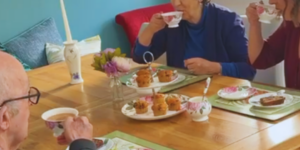1 in 8 people over the age of 15 is a Carer here in Ireland. That is about 516,594 people in the country that are providing unpaid care.
The number of informal Carers is growing and the stress and pressure of it all can be difficult to cope with. It’s important to know that there is support out there, such as the Care Alliance, Family Carers Ireland, and HCA & Carers Ireland.
These groups offer support, guidance, and a helping hand when needed. They advocate for Carers across the country and help bring awareness to informal care with the likes of National Carers Week, which is in the middle of June, every year.
That is why we have come up with a few emotional and practical tips for current Carers and those who are thinking of becoming Carers to their loved ones.
What is a Carer?
A Carer is anyone who provides significant level of support for dependent children and adults. This can range from being a full-time Carer for elderly parents, children or even their partners.
You can care for anyone from your partner, parent, adult child, sibling or even a grandparent.
Practical Tips For Becoming a Carer
Don’t Go It Alone:
When it comes to caring for a loved one, it can be easy to feel like you need to take it all on and do it yourself. But, caring doesn’t need to be an all or nothing job. Getting help is not failing, in fact, it could be the most sensible thing you could do.
Share the load, ask friends and family members for help (that they would feel comfortable with of course). Let them know what type of care that is needed and they can volunteer their services.
Some can feel resentful of family members who can’t or won’t help, so give them a chance to step up and help. If all else fails, there are professional caregivers out there that can help. As mentioned above, the Care Alliance, HCA & Carers Ireland and Family Carers.
Building a care team will both you and the one you care for.
Time Management
Caring for someone is a job and like any job, you need to manage your time and prioritize. Prioritizing can also mean that you need to accept that everything won’t get done, especially if you are caring for someone and have another job.
As someone who loves her ‘to-do‘ lists, it can really help. Try labeling tasks as:
- Urgent – Must get done
- Important – To do soon
- Like to have’s – Would be nice to have done
This is the divide and conquer method. It will help you ensure that all important caring needs will be carried out and should you have extra time, you can give the ‘Like to have’s‘ a go.
Talk to Your Boss
There are many who work and care for a loved one. This can be a tricky one and can come with added pressure and stress. Your caring responsibilities can lead to a conflict with work and then of course there is the added financial pressure.
It can be hard to ask for time off of work, especially if you believe your boss won’t support you. Even then, it’s important to talk to your boss. There could be days where you just don’t feel you have that ‘get up and go‘ attitude and you need time to recoup. Let your boss know about your situation, they may surprise you and offer a level of understanding and possibly even help where they can.
When I say help, this could mean, offering flexible work hours, giving longer lunches on specific days and sharing responsibilities across the team instead of adding to your already stressful plate.
Emotional Tips For Becoming a Carer
Acknowledge Those Difficult Emotions
Just because you are a Carer, does not mean you need to be ‘caring‘ or feel ‘caring‘ every waking minute. It’s unrealistic and will hurt when you realise that you can’t meet these expectations you’ve put on yourself.
When you care for someone you love, you won’t always feel happy, caring or even, giving. Sometimes, you may feel angry, frustrated or dare I say it, hate the person you care for.
This can happen when caring for a parent. It’s a relationship where you are mostly used to caring for you. This could leave you feeling angry or betrayed in a way and sadly, feeling like this can then let the guilt creep in.
Just because you feel these things, does not mean you have to act on them. Simply acknowledging them can be enough to let them slide. Try talking to a trusted friend or family member. It will help you blow off steam.
Don’t forget, you are only human.
Make Time for You
Carers need care too you know! How can you care for someone else if you are not looking after yourself too?
You can’t be a good Carer if you are exhausted, stressed and generally strung out all the time. Yes, ok, it may feel self-indulgent but so what. You need to care for you in order to be a Carer.
Make time for yourself to:
- Get enough sleep
- Keep and maintain the relationships that bring you joy
- Take time for things that brings you joy, whether it’s a run around the park, a long hot bath or enjoying a cup of tea while it’s still hot
- Talking to someone who is a good listener, sometimes all we want to be heard
Feeling Guilty? That’s OK
Caregivers guilt is a real thing and this can affect your self-esteem, mental health and wellbeing.
The guilt can creep in if you feel you are not living up to a particular ideal. Whether it’s an ideal you created or external expectation placed on you. You could be doing everything you possibly can and have been giving 110% each day but somehow caregivers guilt gets in.
Feelings of guilt can come when:
- You feel you are not being as patient as you could be with with the one you care for
- Feeling you don’t have enough time for caring
- Not giving work your all when you are in because of the caring responsibilities
- Neglecting other relationships due to caring
- Feeling resentful for what you have to give up to be a Carer
While guilt can be hard to shake, there are a few tips we have below to help:
- Talk to an impartial party about what’s going on and how you feel. It can help you gain perspective
- Recognize these feelings and try to understand that it’s ok
- Remind yourself of all the good you have achieved
- Adjust your expectations
- Take it one day at a time
- Be kind to yourself














Leave a Comment